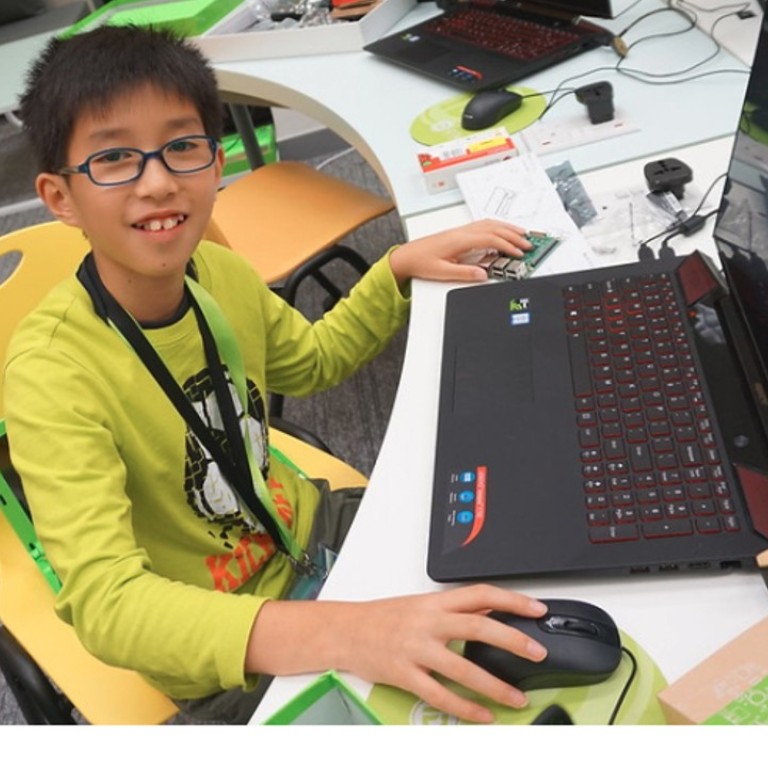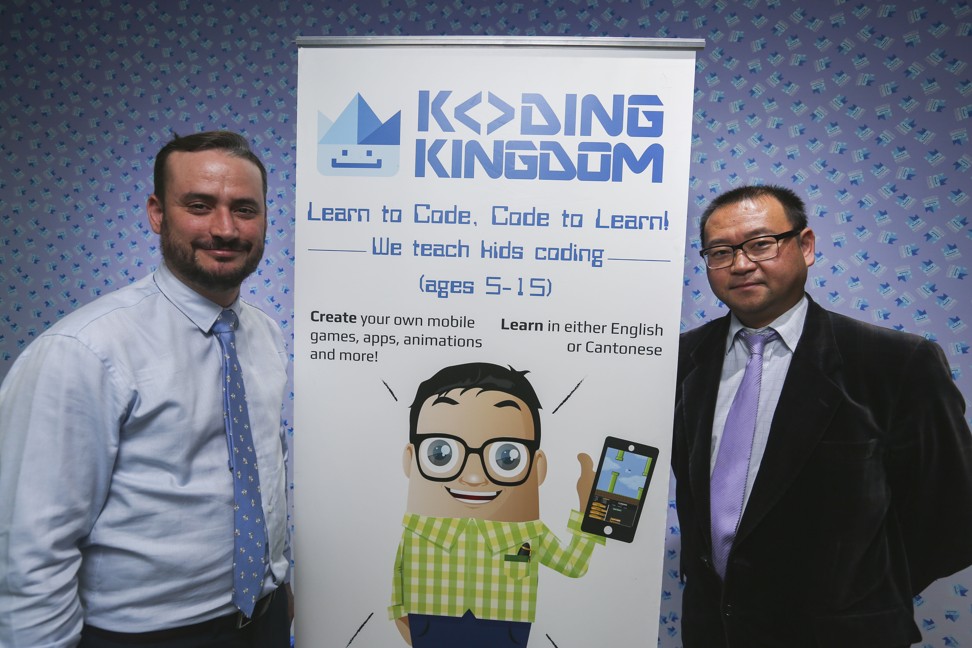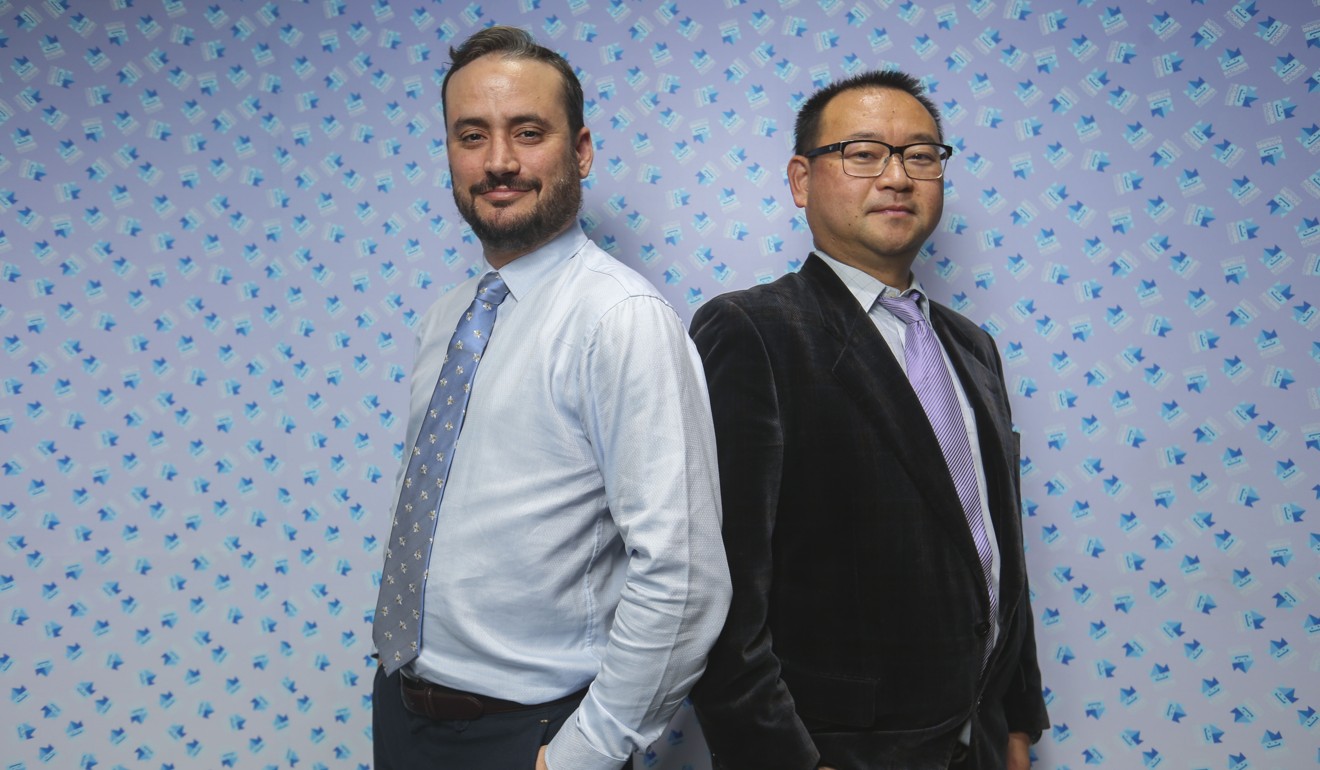
Coding crusaders see tech camps for Hong Kong students taking off as more parents grasp it’s an essential skill for the future
Biggest US coding camp provider iD Tech ran its first Hong Kong programme last summer, and will offer a bigger one this year. ‘Soon, not knowing how to code will be like not knowing how to read,’ iD Tech’s Kris Kasper says
Children’s summer camps in Silicon Valley tend to be a little different from those held in the rest of the US.
In the area around San Francisco Bay, renowned as a hotbed of innovation and home to pioneering technology companies including Google and Apple, parents prefer not to send their children on kayak adventures or arduous mountain treks. Instead, youngsters aged from seven to 17 are more likely to be engaged in computer code writing over their summer holiday, and experts predict these Silicon Valley -style “tech camps” are about to become a huge hit in Hong Kong.
Coding is the language of progress, and Hong Kong needs to master it quickly
“Last year was our first year operating outside the USA, and we decided to start in Hong Kong,” says Kris Kasper, international programme manager of iD Tech, the leading tech camp provider in the US. Its first project in Hong Kong, held at the University of Hong Kong last summer with about 250 children taking part over seven weeks, was more than 95 per cent subscribed. This year it intends to triple the size of the camp and also offer the Chinese University of Hong Kong (CUHK) campus as an option for the first time.
“We only work with the top universities so our students can also experience walking in the halls of the campus and, maybe, aspire to study there later in life,” says Kasper. In the US, iD Tech hosts its camps at prestigious campuses such as Princeton, Stanford and the Massachusetts Institute of Technology (MIT).
The company set its sights on Hong Kong because, over the last three years, more than 800 families from Hong Kong and China have sent their children to iD Tech camps in the US.
Coding is what makes it possible for us to create computer software, apps and websites. The courses are week-long modules and Kasper says more parents from East Asia see it as an opportunity to give their children a competitive edge.

“Parents in Hong Kong put high importance on getting their kids into top universities and we also found a good partner in Hong Kong with good technical knowledge and a genuine passion for coding,” he says.
The partner they selected was Koding Kingdom, the coding academy founded by former computer games executive and Oxford University scholar John Huen Man-ho, who is a passionate and outspoken advocate of coding and its vital importance for a child’s learning.
“As a father, I believe that every child, from all walks of life, should have the opportunity to learn coding,” says Huen, speaking with an almost religious zeal at his headquarters in Cyberport. Kasper evidently shares his business partner’s enthusiasm for coding.
We only work with the top universities so our students can also experience walking in the halls of the campus and maybe, aspire to study there later in life
“I guess the simplest explanation is that pretty soon not knowing how to code will be like not knowing how to read,” says Kasper. He rejects the suggestion that any camp that requires students to sit for hours in front of a laptop computer might be considered dull.
“We get the students to modify their favourite video game to tell their own stories,” Kasper explains. With Hollywood-style panache, the company’s website describes the tech camps as “where tech rock stars are made”.
Kasper’s interest in coding led to a creative career in Hollywood as a visual effects artist. Before iD Tech, he worked on several blockbuster movies, including Black Hawk Down, Minority Report and Planet of the Apes.
Not surprisingly, he has no time for the notion that coding does not foster creativity, and explains how coding allowed him to modify standard graphics design packages to perform spectacular creative effects not otherwise possible.
Huen says: “Contrary to popular belief, computer programming is also considered an art by many.”
Tech camps, like much of science and technology education, are a boom business. In 1999, iD Tech was started by Kathryn and Alexa Ingram-Cauchi in a room above Kathryn’s garage in Silicon Valley. From these modest beginnings, it has delivered the tech camp coding experience to more than 275,000 students.
Code for success: Hong Kong computing school trains refugees to work in IT
According to a 2017 report published by Course Report, a respected online directory for tech camps in the US, featuring thousands of alumni reviews, the North American market for code camps is worth US$266 million. This represents a tenfold increase since 2013, and on average each student will invest more than US$11,000 on coding training. The indications are similarly positive in China.
Last year, it was reported by Soochow Securities that the STEM (science, technology, engineering and maths) education market in China is worth some 9.6 billion yuan (US$1.5 billion) annually, a number that is expected to grow to 52 billion yuan within five years. The projection was based on the assumption that four per cent of Chinese students under the age of 18 will take part in these courses. Some industry insiders believe the tech education market will see a big boost following China’s release in July 2017 of an artificial intelligence development road map that aims to make AI-related courses available in primary and middle schools, and equip Chinese students with coding skills.
“It will continue to grow so parents are giving their kids a competitive edge – it’s not going away and it’s something that every child should learn,” Huen says.

In Hong Kong, where coding was only tentatively introduced to primary school curriculums last year, a recent survey by the Croucher Foundation, which has championed excellence in science and technology in Hong Kong for decades, shows a huge increase in extracurricular STEM activities, including coding and technology training.
Its researchers found 1,894 out-of-school STEM programmes were held during in the 12 months to May 31, 2017, a 76 per cent increase on the previous year.
The surge was largely attributed to an increase in science and technology courses, including coding courses, and 93.5 per cent of parents interviewed said they wanted their children to join more out-of-school STEM activities.
Have you done your hour of coding this week?
Huen and Kasper will be launching their first tech camp in Singapore this year, too. They say that, besides obvious fields such as web development and apps, coding applies to many other aspects of our lives and an increasing number of employment fields, ranging from finance and medicine to entertainment and media.
Huen, who also founded the not-for profit organisation Let’s Code and is vice-president of Hong Kong’s Smart City Consortium, thinks the surge in tech training will continue as more parents realise how essential coding skills will be.
“Some schools are already introducing coding lessons, but we are not yet close to the tipping point where parents fully embrace it,” he says, adding that his own family is a case in point.
Huen admits that, given his own advocacy of more coding training for children, he would like to see his own two young children do a little more, but his wife is not fully convinced of the relative merits of coding compared to language training or music lessons.

“The mother can sometimes be the mountain,” he says resignedly. Huen thinks it’s largely a generational anomaly, because unless parents were trained in engineering or computer science, they would have little appreciation of the vital role of what he describes as the “fifth essential skill”.
Ten to 20 years ago, relatively few women were studying technology-based subjects at university, and the gender disparity is something iD Tech (co-founded by two women) is keen to address. “We are always trying to change the gender disparity in tech,” says Kasper.
Calling all girl computer coders: the world needs you
In the US, iD Tech offers the Alexa Café Experience, inspired by co-founder Alexa Ingram-Cauchi. The all-girls programme blends tech, entrepreneurship, and social activism in an informal, café-like setting, and Kasper says it has produced positive results. He aims to bring the programme to Hong Kong in 2019.
“The ratio of girls to boys on our camps is improving all the time, and as we keep pushing the needle it keeps moving,” he says.

Kasper is bullish about the future of tech camps in Hong Kong, forecasting that all spaces will be filled on this year’s camp, which offers seven modules running from June 25 to August 10.
Some schools are already introducing coding lessons, but we are not yet close to the tipping point where parents fully embrace it
“You can come for the day or stay overnight – it’s a week-long programme,” he says. Instructors tend to be postgraduate computer science students carefully vetted for their knowledge and communications skills. The course ends with a presentation at a “Friday family showcase”, where students present their projects.
Kasper thinks adults would also benefit from lessons in coding.
“I would advocate coding for adults too, if only to show it’s nothing to be afraid of. It’s just giving instructions to a computer, and if you participate as a parent you will also have the tools to communicate better with your child,” he says.
“Coding is just like any other language; the earlier you learn the easier it will be.”

